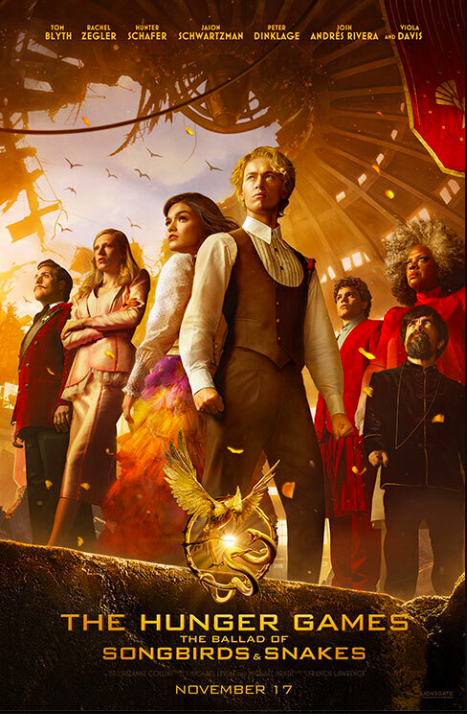Photo Courtesy of Lionsgate
Yes, as always, the book is better than the film, but it is definitely worth the watch
Darian Trabold, Managing Editor
Get in the car and let’s go back to 2014! Taylor Swift dropped 1989 (Taylor’s Version). Josh Hutcherson and Jennifer Lawrence star in the two popular films on Letterboxd (Five Nights at Freddy’s and No Hard Feelings, respectively). And there is a new Hunger Games movie. The Hunger Games: The Ballad of Songbirds and Snakes is adapted from the best-selling dystopian prequel by Suzanne Collins, which provides fans with the backstory of the franchise villain Coriolanus Snow.
The film takes its audience back to the 10th annual Hunger Games, 64 years prior to the events of the first film, in which a young Coriolanus Snow is a student at the Capitol Academy. He is assigned to mentor Lucy Gray Baird, the District 12 candidate for the 10th Hunger Games. The Snow family has lost its fortune, so Snow and Lucy Gray’s fate have become intertwined, as he needs her to succeed in the Games so that he can win the Plinth Prize. Throughout the movie, we watch Snow descend more into the power-hungry villain we know him to be in the original trilogy, rather than a sympathetic character turned bad.
Through this film, we get the origin story of “The Hanging Tree,” which provides insights into why Snow hates Katniss Everdeen so much, and many other nods to the original trilogy. However, as someone who has read the book, the movie was missing key aspects of the novel that made Snow’s villain origin story make sense. In the movie, it feels like it’s the Hunger Games one second, and Snow is losing his mind the next. In the book, readers benefit from Snow’s inner monologue, which enhances the story. The movie could have benefitted from a You-Joe Goldberg-like inner monologue to give a little more insight into the character.
Rachel Zegler, who plays Lucy Gray Baird, does a good job of representing Appalachian culture and folk tradition. I know many complained about her accent in the film. However, District 12 is in modern-day Appalachia, so I felt it was a minor detail executed perfectly on her part. Her voice is amazing, and her portrayal of Lucy Gray was powerful. Tom Blyth as Snow was another phenomenal casting choice; he really makes you want to root for Snow, despite what he has done. Viola Davis proved again that she is one of the best actresses of all time. This was a different role from what I have seen her in, but she pulls off Dr. Gaul’s villainy in a way no one else could. Hunter Schafer as Tigris delivers one of the most chilling lines in the movie when she begins to refer to Snow as Coriolanus instead of Coryo at the end of the movie. Tigris signals to us that Snow has become the same man we know him to be from the original films.
Personally, I found that the film spent too much time on the Hunger Games itself. I think that this caused it to deviate from the fact that this film demonstrates Snow’s villain origin story; it is not about the 10th annual Hunger Games. Thus, the ending felt a little rushed. I did like the subtilities of Snow’s character such as how jealous, and borderline possessive, he got with Lucy Gray and her ex. It shows us how he is incapable of loving Lucy Gray unless he is in total control. Even with his relationship with his “best friend” Sejanus, his ambition clouds his judgment. He shows that he will do whatever it takes to get to the top — to affirm that Snow, does in fact, land on top — whereby the film does a good job of subtly conveying this.
While Catching Fire is still the best Hunger Games movie in my opinion, The Ballad of Songbirds and Snakes is a close second. The acting, the soundtrack, and the story all work seamlessly together to bring us back to Panem and learn more about the man we love to hate: Coriolanus Snow.




